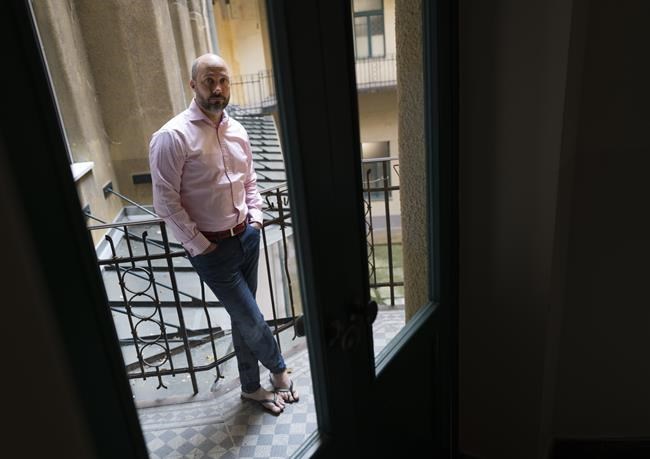
Novelist Mark Mezei poses for a photo in his home in Budapest, Tuesday, July 13, 2021. A recent Hungarian law that prohibits “depicting or promoting” homosexuality or sex reassignment to minors has some bookstores in Hungary placing notices at their entrances, warning customers over books containing “non-traditional content.” Some writers and publishers say the controversial law narrows free thought and expression in literature - and are uncertain over whether works that depict homosexual themes will require labeling to keep them from reaching minors under 18. (AP Photo/Bela Szandelszky)
July 15, 2021 - 11:53 PM
BUDAPEST, Hungary (AP) — Some bookstores in Hungary placed notices at their entrances this week telling customers that they sell "non-traditional content.” The signs went up in response to a new law that prohibits “depicting or promoting” homosexuality and gender transitions in material accessible to children.
While some writers, publishers and booksellers say the law curtails free thought and expression in Hungary, the country's second-largest bookstore chain, Lira Konyv, posted the advisory notices to be safe. The new prohibition took effect last week, but the government has not issued official guidance on how or to whom it will be applied and enforced.
“The word ‘depicts’ is so general that it could include anything. It could apply to Shakespeare’s sonnets or Sappho’s poems, because those depict homosexuality,” Krisztian Nyary, the creative director for Lira Konyv, said of the legislation passed by Hungary's parliament last month.
The law, which also prohibits LGBT content in school education programs, has many in Hungary's literary community puzzled, if not on edge, unsure if they would face prosecution if minors end up with books that contain plots, characters or information discussing sexual orientation or gender identity.
Hungary's populist government insists that the law, part of a broader statute that also increases criminal penalties for pedophilia and creates a searchable database of sex offenders, is necessary to protect children.
But critics, including high-ranking European Union officials, say the measure conflates LGBT people with pedophiles and is another example of Hungarian government policies and rhetoric that marginalize individuals who identity as lesbian, gay, bisexual, transgender or queer.
Last week, a government office in the capital of Budapest announced it had fined Lira Konyv $830 for failing to clearly label a children’s book that depicts families headed by same-sex parents.
The office said the bookstore broke consumer protection rules by failing to indicate that the book contained “content which deviates from the norm.”
The fine, Nyary said, set a precedent for further potential sanctions against publishers and booksellers. With the threat of further penalties looming, all of Lira Konyv's roughly 90 bookstores will now carry customer warnings that read, “This store sells books with non-traditional content.”
Noemi Kiss, the author of several novellas that address contemporary social problems and feature some characters that are not straight or whose gender identity does not match the one they were assigned at birth, said she supports parts of the law that are intended to stop pedophilia and to protect children from pornographic content.
But she called making literature off-limits based on whether it contains LGBT themes “absurd” and “a limitation of freedom of opinion and expression.”
“Based on what will writers be categorized? If (an author) writes a gay story, will they be completely discredited, or shall we completely rewrite all of world literature?” Kiss said.
The EU's executive commission launched two legal actions against Hungary on Thursday over the new law and in response to earlier labeling requirements for children's books that “display patterns of behavior that differ from traditional gender roles” — though authorities did not make clear what non-traditional gender roles entail.
“Hungary restricts the freedom of expression of authors and book publishers, and discriminates on grounds of sexual orientation in an unjustified way,” the European Commission said in a statement, adding that the government had not provided "any justification as to why exposure of children to LGBTIQ content would be detrimental to their well-being.”
Along with outlawing LGBT content for children, the law also prohibits depicting “sexuality for its own sake” to young audiences - a proscription that Nyary said could arguably apply to the majority of titles Lira Konyv sells.
“If someone wanted to, they could report three-quarters of world literature based on this definition,” he said.
Hungary’s government did not respond to a request for comment.
Nyary says he is compiling an anthology of classic literature that contain LGBT themes. The collection of stories, poetry and plays will include writings by Homer, Shakespeare and Sappho, among others — and will come marked with an 18+ sticker to indicate only adults should read it.
"We want to show what this law prohibits young people from accessing," Nyary said.
Mark Mezei, a novelist in Budapest who has published a book featuring a lesbian relationship, says that while he believes established authors will not practice self-censorship, the new law could “knock the pen out of the hands” of young wordsmiths and stunt a new generation of Hungarian writers.
“If they find that they are facing huge resistance to their early work, it can certainly set them back in the creative process or even push them away from their calling,” he said.
Mezei said he is likely to simply ignore the law, insisting that authors must “create and live autonomously.”
“I think interfering in people’s private lives is one of the attributes of a governing power. But the really good works are born one way or another," he said. "They’ll be on the shelves of libraries when the current powers are just a footnote in the pages of history books.”
News from © The Associated Press, 2021